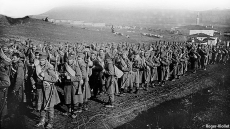
The Balkan Wars were two short wars during 1912-1913, which took place in South Eastern Europe. They were of crucial importance in the run-up to the First World War, as the outcome of these two wars helped to determine the circumstances in which Europe went to war in. The “sick man of Europe” i.e. the Ottoman Empire, was on its last legs at this point. Therefore, countries like Greece, Bulgaria and Serbia went to war with the Ottoman Empire to see what gains they could make once the Ottoman Turks had been defeated.
The First Balkan War began in October 1912. On one side, Greece, Serbia, Bulgaria and Montenegro formed the “Balkan Alliance”, an idea of Eleftherios Venizelos. They went to war with the Ottoman Empire, and after over half a year of fighting, the Treaty of London was signed in May 1913.
The Treaty of London might have ended the war, but it left quite a lot of questions remained unsolved. This included what would happen to the Aegean Islands, and had still left the fate of Crete to be decided by the Great Powers. This involvement by Western European countries definitely impacted the Great War, as disagreements between the Entente (Britain, France and Russia) would play a role later on.
When Bulgaria ceded from the Balkan Alliance in June 1913, because it was unhappy with the amount of territory Greece gained in the area of Macedonia, the Second Balkan War broke out. Although lasting only a couple of months, the outcome of this war meant that Greece had almost doubled its territory and population by the end of 1913. This was important to their aim of expanding the Greek borders, but it also made them a formidable and potential force in the First World War.
The Treaty of Bucharest, signed in August 1913, was important in numerous ways. For starters, it was a great moment for Eleftherios Venizelos, as his diplomatic skills and political knowledge really came in handy. It also meant Bulgaria lost quite a lot of the territory it had gained from the first Treaty, so Greece gained parts of Macedonia, Thrace (including the important city of Thessaloniki), the Aegean Islands and Crete. Though this treaty was good for Greece, their significant gains may actually have become problematic. They had become a powerful naval force in the Eastern Mediterranean, but their ambitious claims to territory in modern-day Albania and many islands in the Mediterranean Sea brought them into direct conflict with Italy. Italy was a European Power at this time, and proved a really big obstacle to Greek expansionism in the period.
So how did these apparently minor wars lead to one of the biggest wars history has ever known? Well, these territorial gains didn’t please everyone. As well as this, Western European powers (particularly Britain and Italy) had a vested interest in some areas covered under the Treaties, so they wanted in on the act too. These unresolved (or poorly solved) issues, among other things, led to the deaths of millions of people during the war, and many more afterwards.
Image from: http://www.economist.com/blogs/easternapproaches/2012/11/balkan-wars

0 Comment:
Be the first one to comment on this article.